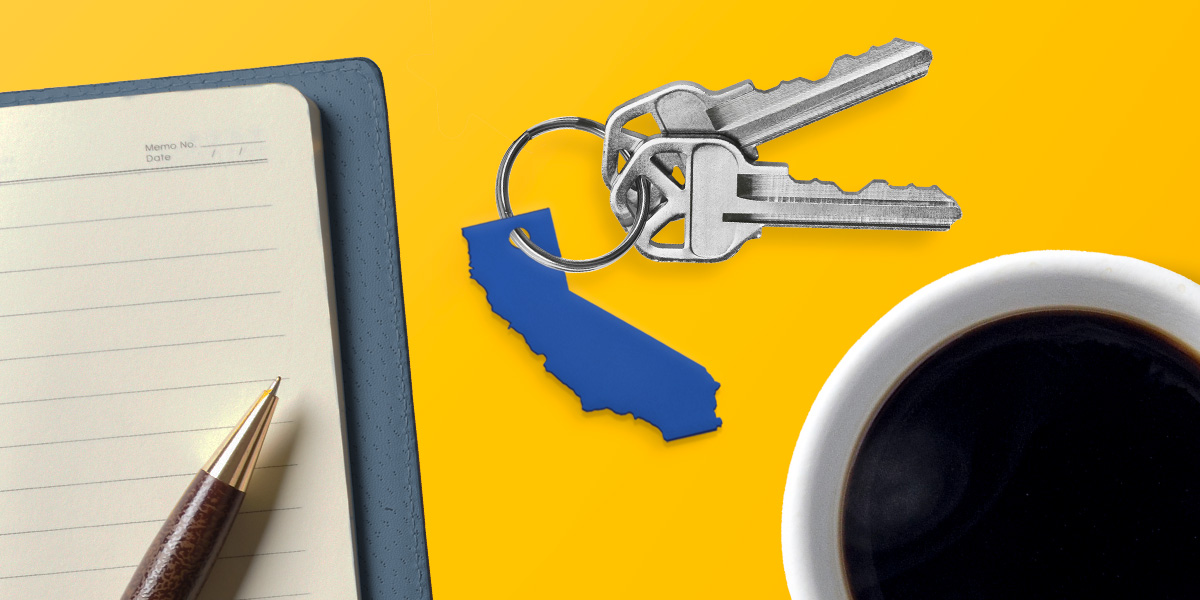-
Personal Banking -
Insights
How to Buy Your First Home
Buying a home can be life-changing. Along with bringing more consistent housing costs and tax benefits, it can also be an opportunity to build wealth through home equity.
But the journey to homeownership is not always clear and can be intimidating for first-time homebuyers. Learning the ins-and-outs of the process can make getting your foot in the door of your first home easier.
So before you start furniture shopping, here are some steps to take toward your homebuying journey.
Determine if Now Is the Right Time for You to Buy a Home
Buying a home is a big commitment — money, energy and patience are a vital part of the process — so getting the timing right is crucial.
Two big factors in determining whether you’re ready to buy a home are your income and employment status. Steps like making sure you have enough money to support your lifestyle and handle a mortgage payment are key to making homeownership sustainable.
Additionally, lenders will want to see that you have had a consistent income history, to provide confidence that you'll be able to sustain the terms of a loan over time.
Steps to Purchasing a Home
Step 1: Start with Saving
Though it might seem obvious, save as much money as possible. If they are not familiar with the process, would-be buyers are often surprised about just how much they actually need to save to get into a first home.
Costs you will need to cover upfront include:
- Down payment
- Closing costs
- Moving costs
Don't forget that saving shouldn't stop after you've bought your home — it's important to continue saving money, and having a savings plan, even after you've settled in. While you can plan for fixed-rate mortgage payments, mortgage insurance and property taxes, you also need a cash reserve for unexpected expenses such as repairs, upgrades and maintenance — not to mention saving for retirement or a child's college education.
Step 2: Review Your Credit Health
Your credit score will be a major factor for mortgage lenders, so maintaining a high score or improving a lower one will be important. Each lender will have different credit score requirements, so checking various requirements can help you set a goal.
Not sure what your credit score is? You have the right to request one free copy of your credit report each year from each of the three major consumer reporting companies. Be careful: There are many credit report scams online, so make sure you don't fall for one by using trusted sources to secure your report.
If your credit score needs improvement, you might want to start with reviewing your debt — paying down your credit card and personal balances to below 30% of your total credit limit can help improve your score. Even paying down your car loan balance can positively affect your credit score.
Of course, improving your credit and paying down debt are easier said than done. Along with saving money, it takes thoughtful planning and careful adherence to a budget. While credit counseling can be a good way to get your credit score in better shape, again be wary of credit repair scams that take advantage of those who are trying to improve their financial health.
Prior to starting the homebuying process, make sure you limit the amount of new credit in your name. For example, when you apply for new credit card or loan, the lender will often run what's called a "hard inquiry." This is a credit check that may trigger a downgrade in your credit score. Avoiding these checks in the months leading up to your home purchase can help maintain your credit health.
Step 3: Determine What Home You Can Afford
Just because you've been approved for a certain mortgage amount doesn't mean you should buy a house that costs that much. Factor your new mortgage payment into your larger household budget to make sure that it will not stretch you and your family too far, then you can set a reasonable price range for your that will help narrow down your search.
Lenders also review your monthly income and compare it to your monthly debt payments. This is called your debt-to-income ratio (DTI), and it can be used to determine the likelihood that you will be able to pay back your mortgage loan.
While there will be a top-end amount that a lender might approve for you, it can be wise not to stretch your budget that much. Many homebuyers follow the 28% rule, meaning that their mortgage payment is no more than 28% of their monthly gross income.
Step 4: Review Your Loan Options
There are various types of mortgages loans, including conventional, jumbo, government-backed, FHA, VA and USDA loans. If you're a first-time homebuyer or a member of an underserved community, there might also be specific loan programs and grants that can help you make homeownership more affordable.
Don't hesitate to ask potential lenders to tell you more about the process so that you are completely comfortable with the deal before it is finalized.
Step 5: Get Pre-Approved with a Lender
When you have money saved, your credit score in good shape and an idea of what type of mortgage best suits your needs, it's time to find a lender you'd like to work with. That lender will look at your situation and decide whether to provide you with "pre-approval."
A pre-approval letter states how much a lender is willing provide to you as a mortgage loan. While not a final number for your budget, a pre-approval will help you set up your cost boundaries and know what options are possible for you while looking at homes.
Step 6: Make Your Wish List
Knowing what you want in a home can help you decide if its within your budget or if you need to make adjustments to your strategy.
For example, you should ask questions like:
- What do you want in a house?
- Where do you want to live?
- How long will you stay in this home?
Importantly, try not to feel stressed if your dream home and location are outside your budget. Instead, determine what is possible for you now and view it as a steppingstone toward where you'd eventually like to be as a homeowner.
Step 7: Pick a Real Estate Agent You Trust
The right real estate agent for you should help you balance your budget and desires and guide you through the homebuying process.
A buyer's real estate agent helps with tasks such as:
- Shopping for homes.
- Negotiations.
- Making offers.
- Tracking paperwork.
- Closing processes.
Research potential agents, ask family and friends for referrals, and see if their experience aligns with your goals. Reviewing their experience and training will give you a peace of mind that they can work with your needs.
For example, you might want to pick a real estate agent who focuses on first-time homebuyers as they might have a better understanding of your needs and what is possible for you in the area you'd like to buy in.
Step 8: Find Your Home
Your real estate agent can help you find homes that align with your desires and budget. While you might love the first home you see, don't neglect the perspective that looking at other places might provide.
Once you find a home that fits your budget, needs and wants, your real estate agent can help you work through the details so you can make an educated decision on moving forward with the process.
Step 9: Make an Offer
When you're ready, your agent will draw up an offer letter that states how much you're willing to pay for the home, which may be less than what the seller is asking, depending on how long the property has been on the market and how it is priced for that area. An offer letter will likely contain contingencies that allow you to walk away from the deal in certain circumstances - for example if a home inspection reveals serious problems on site.
While it's your real estate agent's job to take the lead on making the offer, it’s crucial that you review it and agree with the details before you sign and submit it to the seller.
Step 10: Negotiations
Offers start the negotiations, and usually aren't accepted outright. Sellers can reject your offer if they have better offers coming in, or they might counter your offer with a higher one. Your real estate agent will manage this back-and-forth, which can be intense and fast-moving. Eventually you'll either reach a mutually acceptable deal or withdraw your offer and start looking at more homes.
Step 11: Find Homeowners Insurance
Though it will come later in the process, don’t let homeowners insurance be an afterthought. Many mortgage lenders require homeowners to carry insurance to protect their property.
Even if your lender doesn't require insurance, it's still important to purchase it. Your home is likely your largest asset, and insurance will help shield it from disasters like fire or flooding, depending on the coverage you buy. Homeowners insurance can also help protect you legally if an accident happens on your property and someone is injured.
Carefully research your options, particularly if your home is in an area prone to disasters. Though most policies cover similar items, every policy is different and it’s important that you compare various agencies and policies.
Step 12: Final Walkthrough and Closing
Before closing on your home, you do a final walkthrough to confirm it is in the same condition as when you agreed to purchase it. Carefully scan the walls, floors and other structures for damage that wasn't there before the sellers moved out. Also ensure that all agreed-upon repairs were made to your satisfaction before you do the final closing paperwork.
This article is for general information and education only. It is provided as a courtesy to the clients and friends of City National Bank (City National). City National does not warrant that it is accurate or complete. Opinions expressed and estimates or projections given are those of the authors or persons quoted as of the date of the article with no obligation to update or notify of inaccuracy or change. This article may not be reproduced, distributed or further published by any person without the written consent of City National. Please cite source when quoting.
City National, its managed affiliates and subsidiaries, as a matter of policy, do not give tax, accounting, regulatory, or legal advice, and any information provided should not be construed as such. Rules in the areas of law, tax, and accounting are subject to change and open to varying interpretations. Any strategies discussed in this document were not intended to be used, and cannot be used for the purpose of avoiding any tax penalties that may be imposed. You should consult with your other advisors on the tax, accounting and legal implications of actions you may take based on any strategies or information presented taking into account your own particular circumstances.
Loans and lines of credit are subject to credit and property approval. Additional terms and conditions apply. Not all applicants will qualify. Home equity lines of credit are not available in Texas.




